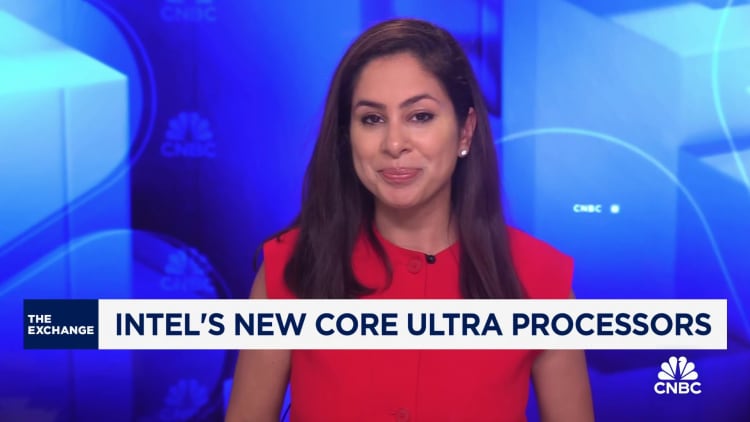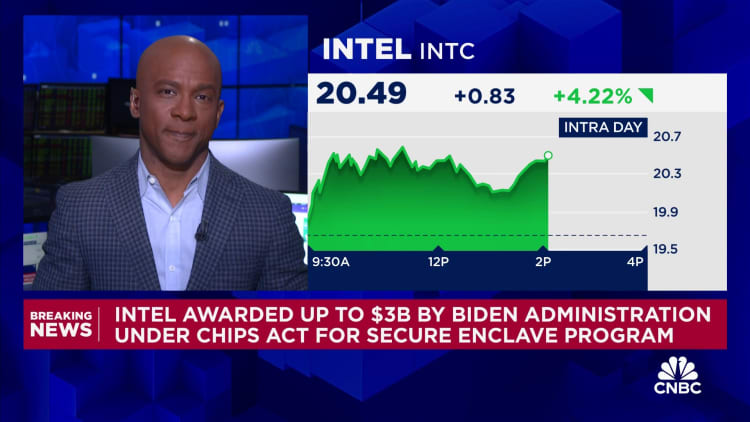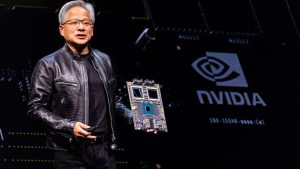Intel stock jumps on plan to turn foundry business into subsidiary and allow for outside funding
- Intel said it’s creating a separate entity for its foundry business, a structure that could allow it to raise outside funding.
- The chipmaker has spent roughly $25 billion on the foundry business in each of the past two years.
- The company’s stock has lost almost 60% of its value in 2024.
Intel shares jumped 8% in extended trading Monday after the company said it plans to turn its foundry business into an independent unit with its own board and the potential to raise outside capital.
As part of CEO Pat Gelsinger’s effort to turn around the struggling chipmaker, Intel said in a memo to employees that it will also sell off part of its stake in Altera.
Gelsinger said the restructuring would allow the foundry business to “evaluate independent sources of funding,” and comes days after Intel’s board met to assess the direction and future of the company. The foundry business, which Intel plans to use to manufacture chips for other customers, has been a big drag on its bottom line, with the company spending roughly $25 billion on it in each of the last two years.
Beyond just considering outside funding, Intel is weighing whether to spin off the foundry business, possibly into a separate publicly traded company, according to a person with knowledge of the matter who declined to be named in order to discuss confidential information.
With a standalone “operating board” and a cleaner corporate structure, the mechanics of a separation become far easier than trying to turn a fully integrated unit into a separate company.
Prior to the postmarket pop, Intel had lost almost 60% of its value this year. The company has given up market share in its core PC and data center business and watched Nvidia run away with the market for chips that power artificial intelligence workloads. In August, Intel reported disappointing quarterly results, sparking the sharpest sell-off in 50 years, and said it would lay off more than 15% of its workforce as part of a $10 billion cost-reduction plan. Gelsinger said the company is about halfway through the layoffs.

Intel will also pause its fabrication efforts in Poland and Germany “by approximately two years based on anticipated market demand,” Gelsinger said, and pull back on its plans for its Malaysian factory. U.S. manufacturing projects will remain unaffected, the company said.
Earlier on Monday, Intel was awarded up to $3 billion from the Biden administration and the CHIPS and Science Act, an effort to bring chipmaking to the U.S. The funding is for the “Secure Enclave” program, which furthers a project between Intel and the Department of Defense.
The U.S. government is bolstering its investment in semiconductor production due largely to the growing geopolitical risk around Taiwan, home to the world’s largest contract chipmaker, Taiwan Semiconductor Manufacturing. U.S. Commerce Secretary Gina Raimondo recently met with Gelsinger, who voiced his frustration over domestic chipmakers’ heavy reliance on Taiwan Semiconductor.
Expanding deal with Amazon
In addition to the foundry announcement, Intel said it entered into a deal with Amazon Web Services to produce custom chips for AI, extending a long-running partnership between the two companies. Amazon is a big customer of Intel chips to power its AWS servers, and will buy a custom Xeon processor from Intel as well, Intel said.
The move will potentially give Intel a new foothold in the growing industry for AI server chips. While Intel has several products that can be used for AI, including Gaudi 3, Nvidia has largely taken control of the market.
Amazon has been developing its own AI chips, including one called Trainium, for over five years. Microsoft and Google have also invested heavily in custom chips to run AI, aiming to offer less expensive processors than Nvidia’s general-purpose graphics processing units.
Intel said that it would carry out its most advanced manufacturing, including the AI chip for AWS, at its plant in Ohio that’s currently under construction.
“All eyes will remain on us,” Gelsinger said. “We need to fight for every inch and execute better than ever before. Because that’s the only way to quiet our critics and deliver the results we know we’re capable of achieving.”
WATCH: Intel awarded up to $3 billion under CHIPS Act

Source: https://www.cnbc.com







More Stories
Nvidia closes at record as AI chipmaker’s market cap tops $3.4 trillion
Trump’s crypto coin goes on sale with Election Day just three weeks out
Nvidia-backed CoreWeave gets $650 million credit line from top Wall Street banks